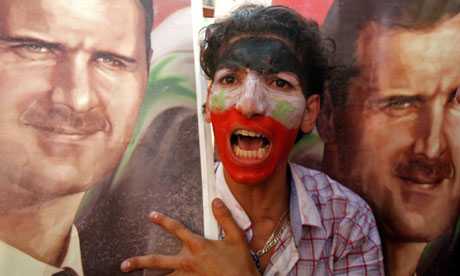Syria reinforces northern border as Turkey loses patience with Assad
Advance on Khirbet al-Jouz seen as a warning after Ankara seeks reforms and end to crackdown on Syrian protesters
* Martin Chulov, Istanbul
* guardian.co.uk, Saturday 25 June 2011 18.38 BST

Syrian officials have ordered military units to step up patrolling near the Turkish border in a warning to its increasingly irate northern neighbour not to establish a buffer zone inside Syria.
Diplomats in Ankara and Beirut believe the Syrian advance on the border village of Khirbet al-Jouz, initially portrayed as a sweep against dissidents, was a veiled threat to Turkey, which is steadily turning on President Bashar al-Assad as his regime’s crackdown on dissent continues.
In the wake of Assad’s speech last week, Turkish officials gave him one week to start reforms and stop the violent suppression of protests, which is estimated to have killed more than 1,400 people in less than four months. At least 18 were killed and dozens more wounded during nationwide protests on Friday – a relatively low toll compared with the past few Fridays. But the pattern of activists being attacked by the security forces remains the same.
British government officials travelled during the week to the south of Turkey to interview Syrian refugees. A Foreign Office official told the Observer that diplomats are compiling accounts of what happened in Jisr al-Shughour and the villages around it during the first two weeks of this month, when the Syrian army mounted a series of raids, followed by an assault that led almost every resident of the 41,000-strong town to flee, first for the nearby hills, then to Turkey.
Among the allegations being investigated are claims that Iranian soldiers operated alongside Syrian units – especially the Fourth Division of the army, which is led by Assad’s brother Maher and has a reputation for ruthlessness.
The European Union last week adopted sanctions against three leading officers of the Iranian Revolutionary Guard Corps, among them Qassem Suleimani, commander of the elite Al-Quds force, who is widely regarded as the leader of all the Iranian military’s clandestine missions abroad.
A senior diplomat in Beirut said on Friday that intelligence agencies had evidence that Iran sent weapons to Syria, but had not yet determined whether there had been an actual Iranian presence at demonstrations.
In a further sign of Turkish unease with Damascus, officials from the country’s Red Crescent who run the five refugee camps along the border no longer seem to be banned from talking to reporters. Embarrassment to Syria has clearly become less of a concern.
Refugee accounts are being used to compile a referral to the international criminal court, which will be asked to prosecute Assad and key regime officials for crimes against humanity. The referral is being prepared by several rights groups, including Insan, which is also compiling testimonies from defecting Syrian soldiers.
Turkey’s growing diplomatic anger at Syria has made Istanbul an attractive hub for the Syrian opposition movement, which has received scores of defectors in recent weeks. Beirut, which is less than three hours’ drive from Damascus and offers easy access to Syrian citizens, is now considered too dangerous for anti-regime dissidents. “It is a clearing house only,” said one Syrian activist who directs a network of dissidents across the border. “There are many ways that the regime can get to people here – they don’t even have to be here themselves. They just use their proxies.”
One Syrian journalist who fled to Beirut has told the rights group Avaaz of his capture by Lebanese military intelligence officers. The journalist says he was seized from a coffee shop in Jounieh, 25km north of Beirut. He said he was first asked by a stranger to step outside for a conversation, then seized and taken to a fetid barracks where he was interrogated for several days.
“During the days I spent in Beirut, some other Syrian activists were kidnapped and extradited to the Syrian security police,” he said. “The Lebanese authorities have also captured the few fugitive Syrian soldiers who had fled Syria through the borders, and then turned them in to Syria, claiming that it had to because of the security agreement signed between the two countries.”
At least 1,000 refugees crossed into Lebanon at the Wadi Khalled border point on Friday, including five men with gunshot wounds, after an assault on the Syrian city of Homs, according to Lebanese officials. A resident of the border village told the Observer that Syrian army units had opened fire towards the wounded as they attempted to enter Lebanon.
via Syria reinforces northern border as Turkey loses patience with Assad | World news | The Observer.


Leave a Reply